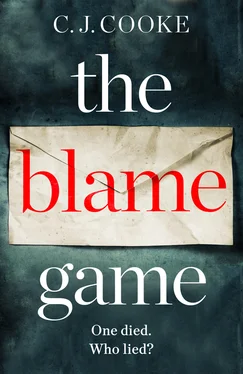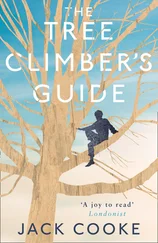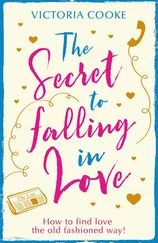1 ...8 9 10 12 13 14 ...18 Helen laughs out loud while Luke and I lie on our backs sending loops of smoke drifting into the night air. I don’t say it, and this is a rare feeling for me, but right now there is simply nowhere else I’d rather be.
6 6. Helen 7. Michael 8. Helen 9. Michael 10. Helen 11. Michael 12. Michael 13. Helen 14. Reuben 15. Helen 16. Helen 17. Helen 18. Michael 19. Helen 20. Helen 21. Michael 22. Helen 23. Reuben Part Two 24. Helen 25. Reuben 26. Michael 27. Helen 28. Michael 29. Michael 30. Helen 31. Reuben 32. Michael 33. Helen 34. Helen 35. Helen 36. Helen 37. Michael 38. Helen 39. Michael 40. Michael 41. Helen Part Three 42. Helen 43. Reuben 44. Helen 45. Helen 46. Helen 47. Reuben 48. Helen 49. Helen 50. Reuben 51. Michael 52. Helen Part Four 53. Michael 54. Helen Acknowledgements A Q&A with C. J. Cooke Keep Reading … About the Author Also by C. J. Cooke About the Publisher
Helen 6. Helen 7. Michael 8. Helen 9. Michael 10. Helen 11. Michael 12. Michael 13. Helen 14. Reuben 15. Helen 16. Helen 17. Helen 18. Michael 19. Helen 20. Helen 21. Michael 22. Helen 23. Reuben Part Two 24. Helen 25. Reuben 26. Michael 27. Helen 28. Michael 29. Michael 30. Helen 31. Reuben 32. Michael 33. Helen 34. Helen 35. Helen 36. Helen 37. Michael 38. Helen 39. Michael 40. Michael 41. Helen Part Three 42. Helen 43. Reuben 44. Helen 45. Helen 46. Helen 47. Reuben 48. Helen 49. Helen 50. Reuben 51. Michael 52. Helen Part Four 53. Michael 54. Helen Acknowledgements A Q&A with C. J. Cooke Keep Reading … About the Author Also by C. J. Cooke About the Publisher
30th August 2017
‘Mum!’
Reuben is running down the hospital corridor towards me, his arms spread wide. He presses his face to my chest and I give a loud cry of relief. There’s a nasty bruise above his right eyebrow, some cuts and dried blood on his forehead, his T-shirt smeared in blood, but otherwise he seems fine. I start to sob – relief or fear, I can’t tell – and he starts to cry, too.
‘Can we go home now, Mum?’ he says, trying to climb on to my knee. ‘I want to go home, OK? Let’s go home.’
‘OK,’ I whisper weakly, wiping tears off my face. ‘We can go home. I promise.’
I tell him as gently as I can not to sit on my lap and hold his hand tightly. The nurse says something that I make out as an urge to keep going, so I tell Reuben to stand and we’re off again, the nurse pushing my wheelchair briskly along the corridor as Reuben staggers alongside me with both hands holding one of mine.
When we turn into a side room I see a figure lying on the bed. Strips of white tape run across his nose, chin, forehead and cheeks, holding a series of tubes and valves leading from his mouth to a monitor by his side.
Slowly I’m skewered by the realisation that this bloodied, unconscious figure is Michael. It’s a realisation that seems to stop time. Trembling, I move closer. A bloodied ear, a small patch of his beard, two blood-encrusted nostrils and a pattern of dried blood on his shin.
‘Why’s Dad not waking up?’ Reuben says behind me. ‘Wake him up, Mum! Wake him!’ His cries wrench at my heart. I try to console him but I grow more and more upset by his distress.
A doctor comes into the room and introduces himself as Dr Atilio. ‘This is your husband?’ he asks me.
I’m gasping for air and my heart is racing. I’m in the grip of a major panic attack.
‘He was awake when the soldiers brought you here,’ I hear the doctor say, though he sounds distant, far away, as though I’m underwater. ‘He is falling in and out of consciousness.’
It’s only when I see Reuben from the corner of my eye and remember that he’s in the room that I somehow find the strength to stop and hold myself together. I hear myself tell Reuben it’s alright, everything is OK, but nothing could be further from the truth. I’m chanting the words over and over to help regulate my heart rate. The nurse moves me close enough to take Michael’s hand. It is limp and covered in dried blood.
I can’t believe this is happening. I can barely breathe. My thoughts whirr and strain to find answers, solutions. I remember with a hard punch to my chest the sight of Saskia on the ground in front of the car.
‘Where is my daughter?’ I shout frantically. ‘Her name … Her name is Saskia. Saskia Pengilly. She’s seven years old, she … she has blonde hair, she was wearing a stripy T-shirt …’
‘We will take you to her,’ the doctor says, and they wheel me abruptly out of Michael’s room towards another ward further along the hallway.
The sight of Saskia on the bed is like a fist slammed into my face. She’s hooked up to machines, there are blood stains on her pink cotton dress, her small, limp hands are bruised and painfully gashed. It is unbearable.
I start to shake, a strangled scream escaping from my open mouth. Even when Reuben starts slapping his head I can’t stop. A nurse appears at my side, pulls the waistband of my shorts down below my hip and sticks a needle in my backside.
Blackness.
‘The lady, she come here for see you.’
A nurse is leaning over me and adjusting a tube in my arm. The room is swaying. Another woman comes into focus. Slim, young. Bobbed black hair, red lipstick. Wide smile. A suit.
‘I’m Vanessa Shoman,’ she says, stretching out a hand. ‘I’m from the British High Commission. The doctor told me that your family had a car accident.’
The knowledge of why I’m here hits me like a wrecking ball. An invisible force sweeping me off my feet and landing me somewhere else in time, outside my own body. Horrifying fragments of the crash flash painfully across my eyes. I wrap my arms around my legs and howl in the space between my knees. I remember crawling on all fours to reach Saskia. She was lying on the ground, about ten feet ahead of the mangled hire car. I remember it was raining and there was glass everywhere. Saskia wouldn’t move. I was screaming for her to wake up.
‘My daughter,’ I tell Vanessa through gulping sobs. ‘She’s seriously injured. I … I don’t know if she’s going to survive.’
I can hardly bring myself to say the words aloud. I can’t stop crying. Reuben is sitting back in his chair, knees to his chest. He looks stricken at the state of me but I’m too helpless to comfort him.
Vanessa rubs my back sympathetically and explains her role as an officer of the High Commission is to help people like me. She assures me she will contact my family and help us get home, but none of it brings any comfort. She tells me we are in a hospital just outside of San Alvaro, one of Belize’s poorest towns. She says the hospitals in this region are understaffed, underfunded, but that a neurosurgeon is coming from Belize City today or tomorrow for Michael and Saskia.
My memories are an explosion of particles that I have to knit together, atom by atom. I remember coming to in the modernist sculpture that used to be the car. I remember Michael slumped like a beanbag in the seat beside me, his right shoulder twisted at an unnatural angle. I was certain he was dead.
What happened after that? How did we get to the hospital?
Vanessa tells me an army truck full of soldiers came across us after the crash. The soldiers dragged Michael and Reuben out of the car, dumped us in their truck and brought us all to the hospital.
‘You were lucky,’ she says. ‘It’s a very remote part of Belize. No towns or villages for many miles. You could have been there a long time before someone found you. Maybe even days.’
She tells me that the soldiers managed to salvage some luggage from our rental car. The bag containing our passports and money is in Michael’s room, but we had other suitcases containing clothes, toys, souvenirs, our mobile phones. Irrelevant, of course, but Vanessa mentions that we were also lucky that the army managed to save them.
Читать дальше












